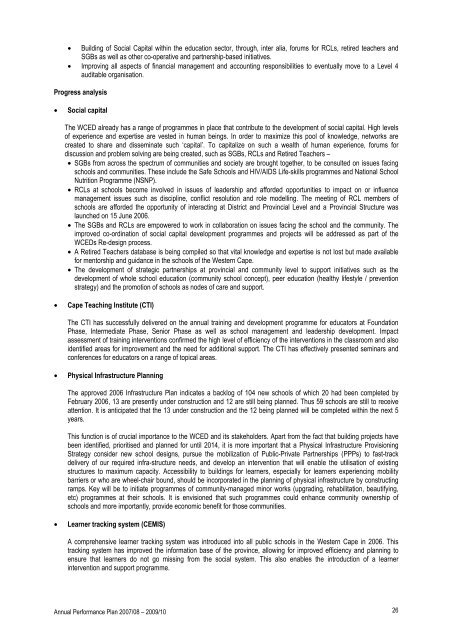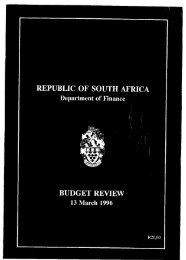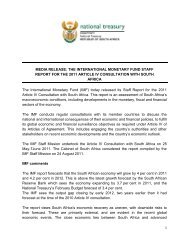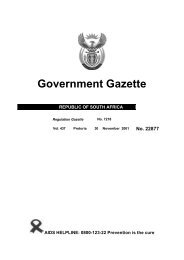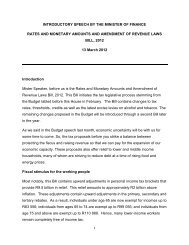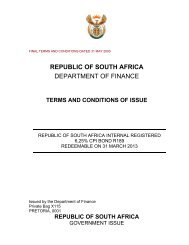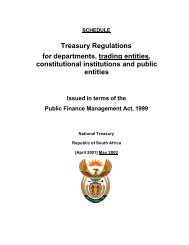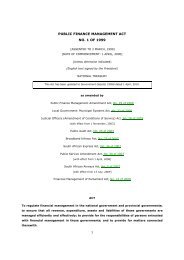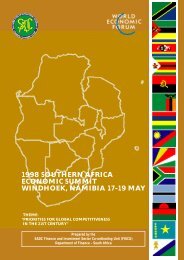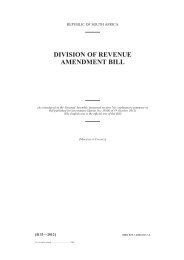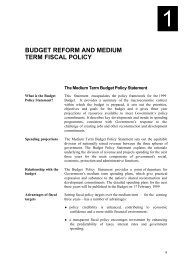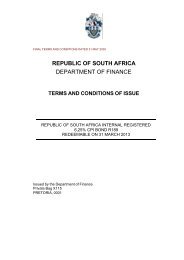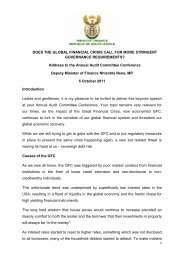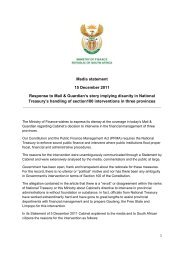Annual Performance Plan Jaarlikse ... - National Treasury
Annual Performance Plan Jaarlikse ... - National Treasury
Annual Performance Plan Jaarlikse ... - National Treasury
Create successful ePaper yourself
Turn your PDF publications into a flip-book with our unique Google optimized e-Paper software.
• Building of Social Capital within the education sector, through, inter alia, forums for RCLs, retired teachers and<br />
SGBs as well as other co-operative and partnership-based initiatives.<br />
• Improving all aspects of financial management and accounting responsibilities to eventually move to a Level 4<br />
auditable organisation.<br />
Progress analysis<br />
• Social capital<br />
The WCED already has a range of programmes in place that contribute to the development of social capital. High levels<br />
of experience and expertise are vested in human beings. In order to maximize this pool of knowledge, networks are<br />
created to share and disseminate such ‘capital’. To capitalize on such a wealth of human experience, forums for<br />
discussion and problem solving are being created, such as SGBs, RCLs and Retired Teachers –<br />
• SGBs from across the spectrum of communities and society are brought together, to be consulted on issues facing<br />
schools and communities. These include the Safe Schools and HIV/AIDS Life-skills programmes and <strong>National</strong> School<br />
Nutrition Programme (NSNP).<br />
• RCLs at schools become involved in issues of leadership and afforded opportunities to impact on or influence<br />
management issues such as discipline, conflict resolution and role modelling. The meeting of RCL members of<br />
schools are afforded the opportunity of interacting at District and Provincial Level and a Provincial Structure was<br />
launched on 15 June 2006.<br />
• The SGBs and RCLs are empowered to work in collaboration on issues facing the school and the community. The<br />
improved co-ordination of social capital development programmes and projects will be addressed as part of the<br />
WCEDs Re-design process.<br />
• A Retired Teachers database is being compiled so that vital knowledge and expertise is not lost but made available<br />
for mentorship and guidance in the schools of the Western Cape.<br />
• The development of strategic partnerships at provincial and community level to support initiatives such as the<br />
development of whole school education (community school concept), peer education (healthy lifestyle / prevention<br />
strategy) and the promotion of schools as nodes of care and support.<br />
• Cape Teaching Institute (CTI)<br />
The CTI has successfully delivered on the annual training and development programme for educators at Foundation<br />
Phase, Intermediate Phase, Senior Phase as well as school management and leadership development. Impact<br />
assessment of training interventions confirmed the high level of efficiency of the interventions in the classroom and also<br />
identified areas for improvement and the need for additional support. The CTI has effectively presented seminars and<br />
conferences for educators on a range of topical areas.<br />
• Physical Infrastructure <strong>Plan</strong>ning<br />
The approved 2006 Infrastructure <strong>Plan</strong> indicates a backlog of 104 new schools of which 20 had been completed by<br />
February 2006, 13 are presently under construction and 12 are still being planned. Thus 59 schools are still to receive<br />
attention. It is anticipated that the 13 under construction and the 12 being planned will be completed within the next 5<br />
years.<br />
This function is of crucial importance to the WCED and its stakeholders. Apart from the fact that building projects have<br />
been identified, prioritised and planned for until 2014, it is more important that a Physical Infrastructure Provisioning<br />
Strategy consider new school designs, pursue the mobilization of Public-Private Partnerships (PPPs) to fast-track<br />
delivery of our required infra-structure needs, and develop an intervention that will enable the utilisation of existing<br />
structures to maximum capacity. Accessibility to buildings for learners, especially for learners experiencing mobility<br />
barriers or who are wheel-chair bound, should be incorporated in the planning of physical infrastructure by constructing<br />
ramps. Key will be to initiate programmes of community-managed minor works (upgrading, rehabilitation, beautifying,<br />
etc) programmes at their schools. It is envisioned that such programmes could enhance community ownership of<br />
schools and more importantly, provide economic benefit for those communities.<br />
• Learner tracking system (CEMIS)<br />
A comprehensive learner tracking system was introduced into all public schools in the Western Cape in 2006. This<br />
tracking system has improved the information base of the province, allowing for improved efficiency and planning to<br />
ensure that learners do not go missing from the social system. This also enables the introduction of a learner<br />
intervention and support programme.<br />
<strong>Annual</strong> <strong>Performance</strong> <strong>Plan</strong> 2007/08 – 2009/10<br />
26


